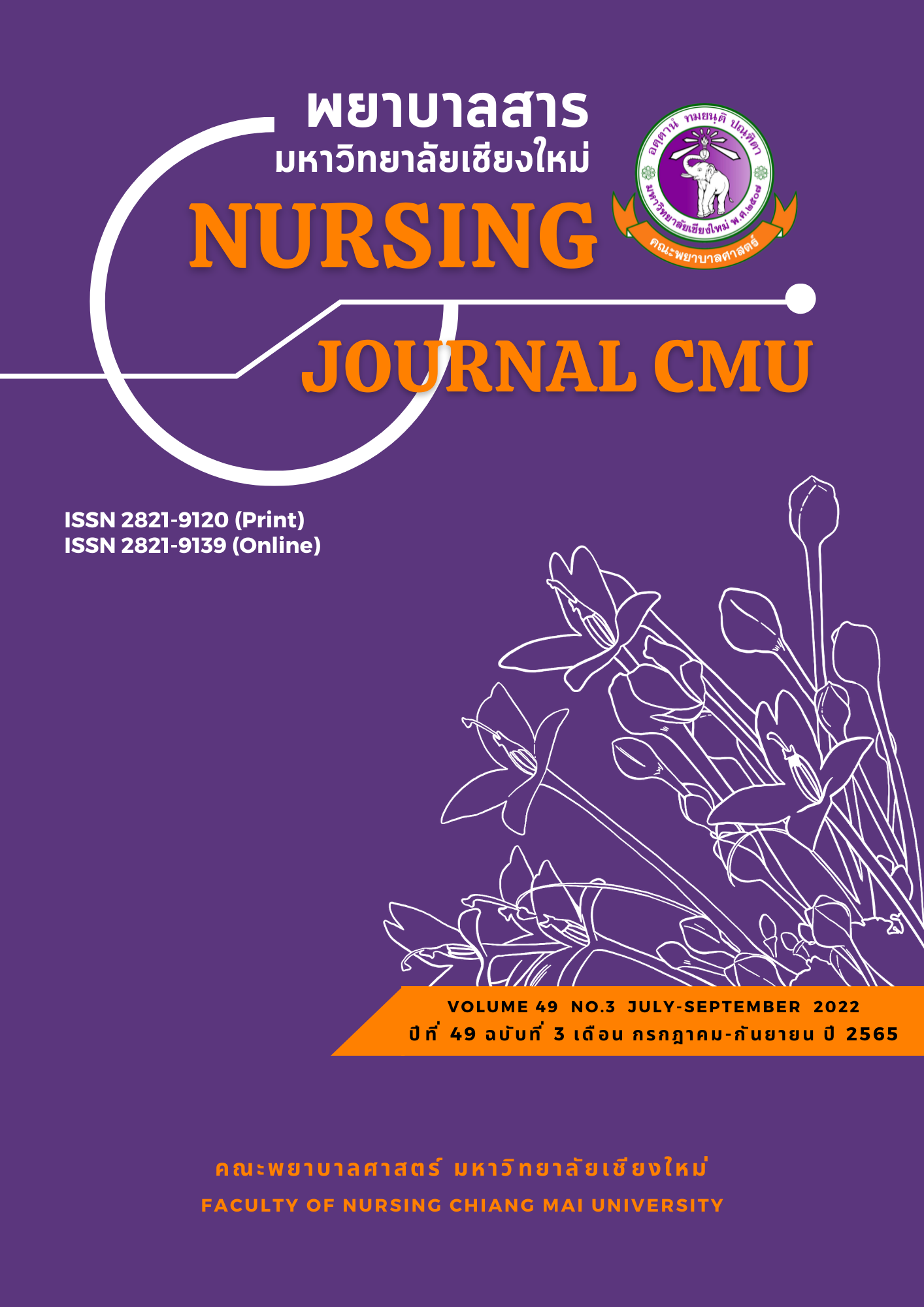Maternal Attitude, Fatigue and Functional Status Among Adolescent Mothers
Keywords:
Maternal attitude, Fatigue, Functional status, Adolescent mothersAbstract
Becoming an adolescent mother is a significant life event. During postpartum, adolescent mothers are confronted with both the physical and psychological changes that may affect the functional status of the adolescent mother. The purpose of this descriptive correlational study was to describe the relationship between maternal attitude, fatigue and functional status among adolescent mothers. The sample were selected following the inclusion criteria and consisted of 85 adolescent mothers aged 13-19 years old who had a postpartum check-up at Maharaj Nakorn Chiang Mai Hospital, Health Promotion Hospital, First Regional Health Promoting Center, Chiang Mai and Lamphun Hospital. The research instruments were the Attitudes Toward Motherhood Scale by Sockol, Epperson, and Barber (2014), Thai version by Pukdeesamai, Sriarporn, and Xuto (2015); the Modified Fatigue Symptoms Checklist by Pugh, Milligan, Park, Lenze, and Kitzman (1999), Thai version by Theerakulchai (2004); and the Inventory of Functional Status After Childbirth for Adolescents by Logsdon (2009), modified by Moortito, Sriarporn, and Baosoung (2015). Data were analyzed using descriptive statistics and Pearson's product moment correlation.
Results of the study revealed that:
- The majority of adolescent mothers had a negative maternal attitude (67.06%, SD = 9.81), and had a low level of fatigue, accounting for 78.82% (SD = 16.66). Regarding the functional status of adolescent mothers, the score was at a moderate level (SD = .25).
- Fatigue had a significant and low negative correlation with functional status after childbirth (r = -.214, p < .05), and maternal attitude had no significant correlation with the functional status of adolescent mothers.
The results of this study can be used as baseline data for planning effective nursing care to promote postpartum functional status among adolescent mothers.
References
Birkeland, R., Thompson, J. K., & Phares, V. (2005). Adolescent motherhood and postpartum depression. Journal of Clinical Child and Adolescent Psychology, 34, 292-300.
Crugnola, C. R., Ierardi, E., Gazzotti, S., & Albizzati, A. (2014). Motherhood in adolescent mothers: Maternal attachment, mother-infant styles of interaction and emotion regulation at three months. Infant Behavior & Development, 37, 44-56.
Cunningham, F. G., Leveno, K. J., Bloom, S. L., Spong, C. Y., Dashe J. S., Hoffman, B. L., Sheffield, J. S. (2014). Williams Obstretrics (24th ed.). New York: McGraw Hill.
Davidson, M. R., London, M. L., & Ladewig, P. W. (2012). Olds' maternal-newborn nursing & women's health across the lifespan. Boston: Pearson.
DeVito, J. (2010). How adolescent mothers fell about becoming a parent. The Journal of Perinatal Education, 19(2), 25-34.
Fawcett, J., & Tulman, L., (1990). Functional status during pregnancy and the postpartum: A framework for research. Journal of Nursing Scholarship, 23, 191-194.
Fawcett, J., Tulman, L., & Myers, S.T. (1988). Development of the inventory of functional status after childbirth. Journal of Nurse Midwifery, 33, 252–260.
Figueiredo, B., Tendais, I., Dias, C. C. (2014). Maternal adjustment and maternal attitudes in adolescent and adult pregnant women. Journal of Pediatric and Adolescent Gynecology, 27(4), 194-201.
Gardner, D.L. (1991). Fatigue in postpartum women. Applied Nursing Research, 4(2), 57-62.
Logsdon, M. C. (2009). Initial psychometric properties of the inventory of functional status after childbirth-revised for adolescents. Journal of Reproductive and Infant Psychology, 27(4). 346-356.
MacDonald, I. B. (2011). Physical activity and postpartum functional status in primiparous women. Retrieved from http://www.qspace.library.queensu.ca/bitstream/1974/6812/1/Barbacsy- MacDonald_Ibo_201109_MSc.pdf
McVeigh, C. (1997). An Australian study of functional status after childbirth. Midwifery, 13, 172-178.
Moortito, W., Sriarporn. P., & Baosoung, C., (2015). Postpartum depression, social support, and functional status among adolescent mothers. Nursing Journal, 44(2), 19-29. (in Thai)
Office of the Permanent Secretary, Ministry of Social Development and Human Security. (2013). The situation of childbirth among Thai adolescents in 2013. Nonthaburi: Ministry of Interior. (in Thai)
Polit, D. F. (2010). Statistics and data analysis for nursing research (2nd ed.). New Jersey: Pearson Education.
Posmontier, B. (2008). Functional status outcomes in mothers with and without postpartumdepression. Journal Midwifery Women Health, 53(4), 310-318.
Pukdeesamai, A., Sriarporn, P., & Xuto, P. (2015). Factors predicting postpartum depression among first-time mothers. Nursing Journal, 44(3), 19-29. (in Thai)
Pugh, L. C., & Milligan, R. (1993). A framework for study of childbearing fatigue. Advanced Nursing Science, 15(4), 60-70.
Pugh, L. C., Milligan, R., Parks, P. L., Lenz, E. R., & Kitzman, F. H. (1999). Clinical approaches in the assessment of childbearing fatigue. Journal of Obstetrics, Gynecologic, and Neonatal Nursing, 28, 74-80.
Rychnovsky, J. (2007). Postpartum fatigue in the active-duty military woman. Journal of Obstetric, Gynecologic, and Neonatal Nursing, 36(1), 38-46.
Secco, M. L., & Moffat, M. E. K. (2003). Situational maternal and infant influences on parenting stress among adolescent mother. Comprehensive Pediatric Nursing, 26(2), 103-122.
Shereshefsky, P. M., & Yarrow, L. J. (1973). Psychological aspects of a first pregnancy and early postnatal adaptation. New York: Raven Press.
Shin, H. & White, R. (2007). The conceptual of transition to motherhood in neonatal intensive care unit. Journal of Advance Nursing, 58(1), 90 – 98.
Sockol, L. E., Epperson, C. N., & Barber, J.P. (2014). The relationship between maternal attitudes and symptoms of depression and anxiety among pregnant and postpartum first-time mothers. Archives of Women's Mental Health,17, 199-212.
Theerakulchai, J., 2004. Factors related to fatigue and fatigue management in postpartum Thai women. Journal of Nursing and Health Research, 8(3), 23-34. (in Thai)
Tulman, L., & Fawcett, J. (1988). Return of functional ability after childbirth. Nursing Research, 37(2), 77-81.
Tulman, L., Fawcett, J., Groblewski, L., & Silverman, L. (1990). Changes in functional status after childbirth. Nursing Research, 39(2), 70-75.
Wahn, E. H., Nissen, E., & Ahlberg, B. M. (2005). Becoming and being a teenage mother. Health Care for Women International, 26(7), 591-603.
Walker, L.O., Crain, H., & Thompson, E. (1986). Maternal role attainment and identity in the postpartum period: Stability and change. Nursing Research, 35, 68-71.
World Health Organization. (2014). Adolescent pregnancy. Retrieved from http://www.who.int/mediacentre/factsheets/fs364/en/
Downloads
Published
How to Cite
Issue
Section
License

This work is licensed under a Creative Commons Attribution-NonCommercial-NoDerivatives 4.0 International License.
บทความที่ได้รับการตีพิมพ์เป็นลิขสิทธิ์ของวารสารพยาบาลสาร
ข้อความที่ปรากฏในบทความแต่ละเรื่องในวารสารวิชาการเล่มนี้เป็นความคิดเห็นส่วนตัวของผู้เขียนแต่ละท่านไม่เกี่ยวข้องกับมหาวิทยาลัยเชียงใหม่ และคณาจารย์ท่านอื่นๆในมหาวิทยาลัยฯ แต่อย่างใด ความรับผิดชอบองค์ประกอบทั้งหมดของบทความแต่ละเรื่องเป็นของผู้เขียนแต่ละท่าน หากมีความผิดพลาดใด ๆ ผู้เขียนแต่ละท่านจะรับผิดชอบบทความของตนเองแต่ผู้เดียว






